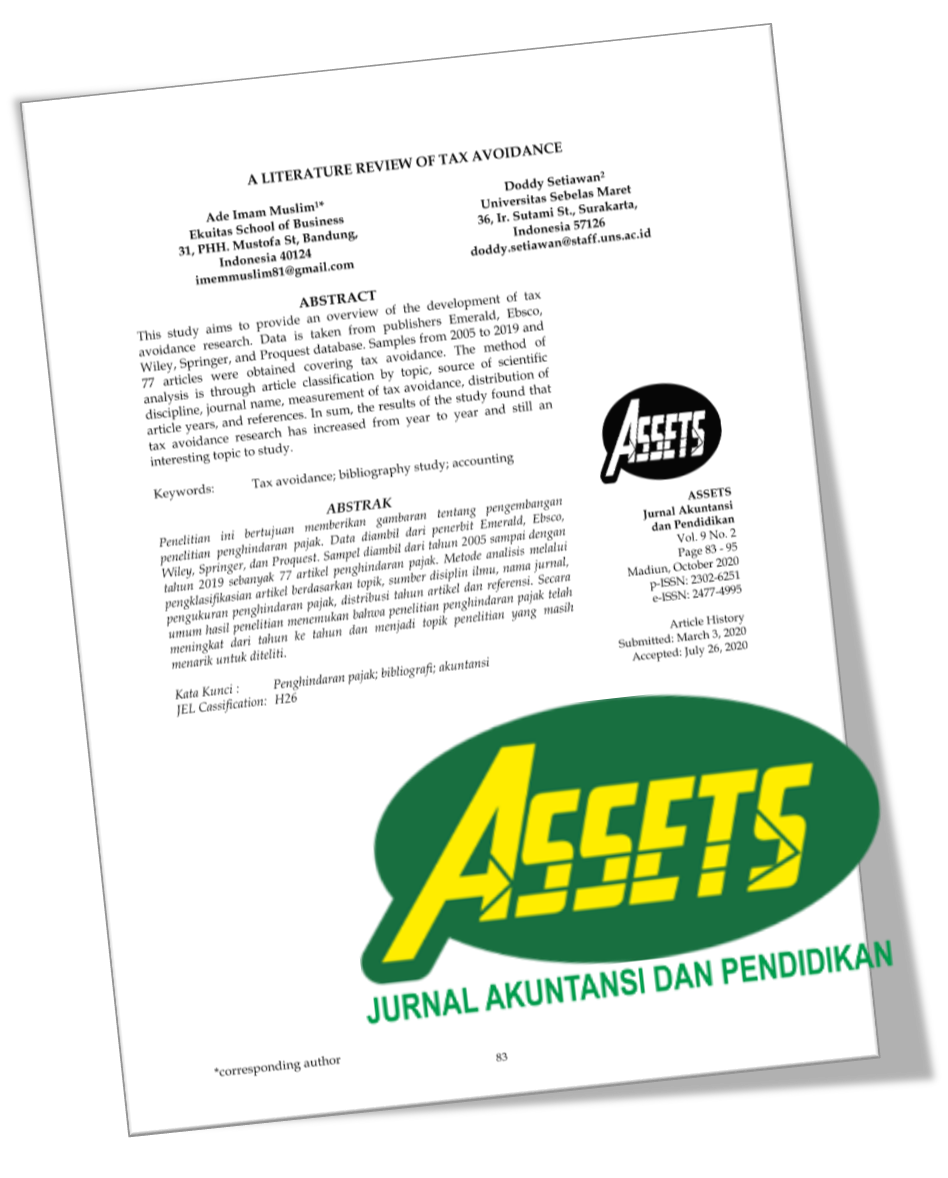THE EFFECT OF WOMEN COMMISSIONERS ON FIRMS' VALUE IN THE INDONESIAN MANUFACTURING INDUSTRY: MEDIATING ROLE OF ENVIRONMENTAL ENGAGEMENT
DOI:
https://doi.org/10.25273/jap.v12i1.13708Keywords:
Upper Echelon Theory, Sustainable Development Goals, Women on Commissioners, Teori Eselon Atas, Tujuan Pembangunan Berkelanjutan, Perempuan di KomisarisAbstract
ABSTRACT
Issues regarding gender equality have been increasing since the United Nations made it one of the global goals in the Sustainable Development Goals. It has put a question of whether the role of women will have a good impact on the company. In this study, female commissioners in 129 Indonesian manufacturing companies will be examined concerning their roles from 2015 to 2019. WarpPLS7.0 software was used to analyze the data using structural equation modeling - partial least squares (SEM-PLS). This study discovered that the association between women on commissions and firms' values is mediated by environmental engagement. Furthermore, this study also found significant influences between Women on Commissioners and Firms' Values. The results of this study are expected to contribute significantly to the development of the literature and can practically be considered by the company's stakeholders.
ABSTRAK
Isu – isu mengenai kesetaraan gender semakin meningkat sejak United Nation menjadikannya sebagai salah satu global goals dalam Sustainable Development Goals. Hal ini memunculkan pertanyaan apakah peran perempuan akan memberikan dampak yang baik di perusahaan. Penelitian ini bertujuan untuk menyelidiki peran komisioner wanita dalam perusahaan – perusahaan di Indonesia. Dengan melibatkan 129 perusahaan manufaktur dalam rentang waktu 2015 – 2019 dan terdaftar dalam Bursa Efek Indonesia (BEI). Data yang diperoleh dianalisis menggunakan structural equation modelling – partial least square (SEM-PLS) dengan software WarpPLS7.0. Dari pengujian tersebut, didapat bahwa Environmental Engagement memediasi hubungan Women on Commissioner terhadap Firms’ Value. Selain itu, penelitian ini juga membuktikan bahwa adanya pengaruh signifikan pada hubungan women on commissioner terhadap firms’ value. Hasil dari penelitian ini diharapkan berkontribusi besar pada pengembangan literatur serta secara praktis dapat menjadi bahan pertimbangan para pemangku kepentingan perusahaan.
Downloads
References
Adams, R. B., & Ferreira, D. (2009). Women in the boardroom and their impact on governance and performance. Journal of Financial Economics, 94(2), 291–309.
Adisa, T. A., Abdulraheem, I., & Isiaka, S. B. (2019). Patriarchal hegemony: Investigating the impact of patriarchy on women’s work-life balance. Gender in Management: An International Journal.
Ahern, K. R., & Dittmar, A. K. (2012). The changing of the boards: The impact on firm valuation of mandated female board representation. The Quarterly Journal of Economics, 127(1), 137–197.
Ahrens, J.-P., Landmann, A., & Woywode, M. (2015). Gender preferences in the CEO successions of family firms: Family characteristics and human capital of the successor. Journal of Family Business Strategy, 6(2), 86–103.
Almazan, A., & Suarez, J. (2003). Entrenchment and severance pay in optimal governance structures. The Journal of Finance, 58(2), 519–547.
Apesteguia, J., Azmat, G., & Iriberri, N. (2012). The impact of gender composition on team performance and decision making: Evidence from the field. Management Science, 58(1), 78–93.
Ararat, M., & Yurtoglu, B. B. (2021). Female directors, board committees, and firm performance: Time-series evidence from Turkey. Emerging Markets Review, 48, 100768.
Ardito, L., Dangelico, R. M., & Messeni Petruzzelli, A. (2021). The link between female representation in the boards of directors and corporate social responsibility: Evidence from B corps. Corporate Social Responsibility and Environmental Management, 28(2), 704–720. https://doi.org/10.1002/csr.2082
Arioglu, E. (2020). Female board members: the effect of director affiliation. Gender in Management, 35(2), 225–254. https://doi.org/10.1108/GM-05-2019-0080
Birindelli, G., Iannuzzi, A. P., & Savioli, M. (2019). The impact of women leaders on environmental performance: Evidence on gender diversity in banks. Corporate Social Responsibility and Environmental Management, 26(6), 1485–1499. https://doi.org/10.1002/csr.1762
Byron, K., & Post, C. (2016). Women on Boards of Directors and Corporate Social Performance: A Meta-Analysis. Corporate Governance: An International Review, 24(4), 428–442. https://doi.org/10.1111/corg.12165
Campbell, K., & MÃnguez-Vera, A. (2008). Gender diversity in the boardroom and firm financial performance. Journal of Business Ethics, 83(3), 435–451.
Chang, L., Li, W., & Lu, X. (2015). Government Engagement, Environmental Policy, and Environmental Performance: Evidence from the Most Polluting Chinese Listed Firms. Business Strategy and the Environment, 24(1), 1–19. https://doi.org/https://doi.org/10.1002/bse.1802
Cordeiro, J. J., Profumo, G., & Tutore, I. (2020). Board gender diversity and corporate environmental performance: The moderating role of family and dual-class majority ownership structures. Business Strategy and the Environment, 29(3), 1127–1144. https://doi.org/10.1002/bse.2421
Croson, R., & Gneezy, U. (2009). Gender Differences in Preferences. Journal of Economic Literature, 47(2), 448–474. https://doi.org/10.1257/jel.47.2.448
De Cabo, R. M., Terjesen, S., Escot, L., & Gimeno, R. (2019). Do ‘soft law board gender quotas work? Evidence from a natural experiment. European Management Journal, 37(5), 611–624.
El Ghoul, S., Guedhami, O., Kim, H., & Park, K. (2018). Corporate environmental responsibility and the cost of capital: International evidence. Journal of Business Ethics, 149(2), 335–361.
Elkington, J. (1997). The triple bottom line. Environmental Management: Readings and Cases, 2.
Gabaldon, P., De Anca, C., Mateos de Cabo, R., & Gimeno, R. (2016). Searching for women on boards: An analysis from the supply and demand perspective. Corporate Governance: An International Review, 24(3), 371–385.
Gangi, F., D’Angelo, E., Daniele, L. M., & Varrone, N. (2020). The impact of corporate governance on social and environmental engagement: What effect on firm performance in the food industry? British Food Journal.
Gangi, F., Daniele, L. M., & Varrone, N. (2020). How do corporate environmental policy and corporate reputation affect riskâ€adjusted financial performance? Business Strategy and the Environment, 29(5), 1975–1991.
Garanina, T., & Muravyev, A. (2020). The gender composition of corporate boards and firm performance: Evidence from Russia. Emerging Markets Review, xxxx, 100772. https://doi.org/10.1016/j.ememar.2020.100772
GarcÃa MartÃn, C. J., & Herrero, B. (2020). Do board characteristics affect environmental performance? A study of EU firms. Corporate Social Responsibility and Environmental Management, 27(1), 74–94. https://doi.org/10.1002/csr.1775
González, M., Guzmán, A., Pablo, E., & Trujillo, M. A. (2020). Does gender really matter in the boardroom? Evidence from closely held family firms. In Review of Managerial Science (Vol. 14, Issue 1). Springer Berlin Heidelberg. https://doi.org/10.1007/s11846-018-0292-1
Hambrick, D. C. (2007). Upper echelons theory: An update. In Academy of management review (Vol. 32, Issue 2, pp. 334–343). Academy of Management Briarcliff Manor, NY 10510.
Hambrick, D. C., & Mason, P. A. (1984). Upper Echelons: The Organization as a Reflection of Its Top Managers. The Academy of Management Review, 9(1), 193–206. https://doi.org/doi:10.2307/258434
Handayani, I. (2019). Perubahan Gaya Hidup Dorong Tren Penerapan Bisnis Berkelanjutan. https://investor.id/lifestyle/192061/perubahan-gaya-hidup-dorong-tren-penerapan-bisnis-berkelanjutan
Haslam, S. A., Ryan, M. K., Kulich, C., Trojanowski, G., & Atkins, C. (2010). Investing with Prejudice: the Relationship Between Women’s Presence on Company Boards and Objective and Subjective Measures of Company Performance. British Journal of Management, 21(2), 484–497. https://doi.org/https://doi.org/10.1111/j.1467-8551.2009.00670.x
Huang, J., & Kisgen, D. J. (2013). Gender and corporate finance: Are male executives overconfident relative to female executives? Journal of Financial Economics, 108(3), 822–839.
Kementerian Perindustrian. (2019). Industri Manufaktur Berperan Penting Genjot Investasi dan Ekspor. https://kemenperin.go.id/artikel/20091/Industri-Manufaktur-Berperan-Penting-Genjot-Investasi-dan-Ekspor-
Khan, S., Hussain, R. I., Ur-Rehman, S., Maqbool, M. Q., Engku Ali, E. I., & Numan, M. (2019). The mediating role of innovation between corporate governance and organizational performance: Moderating role of innovative culture in Pakistan textile sector. Cogent Business and Management, 6(1). https://doi.org/10.1080/23311975.2019.1631018
Khan, W. A., & Vieito, J. P. (2013). CEO gender and firm performance. Journal of Economics and Business, 67, 55–66.
Li, Z., Liao, G., & Albitar, K. (2020). Does corporate environmental responsibility engagement affect firm value? The mediating role of corporate innovation. Business Strategy and the Environment, 29(3), 1045–1055. https://doi.org/10.1002/bse.2416
MacKinnon, D. P., & Tofighi, D. (2012). Statistical Mediation Analysis. In Handbook of Psychology, Second Edition. https://doi.org/10.1002/9781118133880.hop202025
Martinez-Jimenez, R., Hernández-Ortiz, M. J., & Cabrera Fernández, A. I. (2020). Gender diversity influence on board effectiveness and business performance. Corporate Governance (Bingley), 20(2), 307–323. https://doi.org/10.1108/CG-07-2019-0206
Menicucci, E., Paolucci, G., & Paoloni, N. (2019). Does gender matter for hotel performance? Evidence from the Italian hospitality industry. International Journal of Tourism Research, 21(5), 625–638. https://doi.org/10.1002/jtr.2286
Moreno-Gómez, J., Lafuente, E., & Vaillant, Y. (2018). Gender diversity in the board, women’s leadership and business performance. Gender in Management: An International Journal.
Nations, U. (2015). 17 Goals to Transform Our World. https://www.un.org/sustainabledevelopment/
Niederle, M., & Vesterlund, L. (2007). Do women shy away from competition? Do men compete too much? The Quarterly Journal of Economics, 122(3), 1067–1101.
Nurcaya, I. A. (2020). Pengelolaan Lingkungan, KLHK Soroti Sektor Manufaktur. https://ekonomi.bisnis.com/read/20200209/257/1199097/pengelolaan-lingkungan-klhk-soroti-sektor-manufaktur
Nwagbara, U. (2020). Institutions and organizational work-life balance (WLB) policies and practices: Exploring the challenges faced by Nigerian female workers. Journal of Work-Applied Management, 12(1), 42–54.
Orazalin, N. (2020). Board gender diversity, corporate governance, and earnings management: Evidence from an emerging market. Gender in Management, 35(1), 37–60. https://doi.org/10.1108/GM-03-2018-0027
Queensland, U. of S. (2003). Equal Opportunity for Women in the Workplace Agency Report: 2002/2003. University of Southern Queensland.
Reguera-Alvarado, N., de Fuentes, P., & Laffarga, J. (2017). Does Board Gender Diversity Influence Financial Performance? Evidence from Spain. Journal of Business Ethics, 141(2), 337–350. https://doi.org/10.1007/s10551-015-2735-9
Russo, M. V, & Fouts, P. A. (1997). A resource-based perspective on corporate environmental performance and profitability. Academy of Management Journal, 40(3), 534–559.
Sarkar, J., & Selarka, E. (2021). Women on board and performance of family firms: Evidence from India. Emerging Markets Review, 46(March 2020), 100770. https://doi.org/10.1016/j.ememar.2020.100770
Schons, L., & Steinmeier, M. (2016). Walk the talk? How symbolic and substantive CSR actions affect firm performance depends on stakeholder proximity. Corporate Social Responsibility and Environmental Management, 23(6), 358–372.
Shou, Y., Shao, J., Lai, K., Kang, M., & Park, Y. (2019). The impact of sustainability and operations orientations on sustainable supply management and the triple bottom line. Journal of Cleaner Production, 240, 118280.
Singh, A. K., Singhania, S., & Sardana, V. (2019). Do Women on Boards Affect the Firm's Financial Performance? Evidence from Indian IPO Firms. Australasian Accounting, Business and Finance Journal, 13(2), 53–68. https://doi.org/10.14453/aabfj.v13i2.4
Sohn, J., Lee, J., & Kim, N. (2020). Going green inside and out: Corporate environmental responsibility and financial performance under regulatory stringency. Sustainability, 12(9), 3850.
Song, H. J., Yoon, Y. N., & Kang, K. H. (2020). The relationship between board diversity and firm performance in the lodging industry: The moderating role of internationalization. International Journal of Hospitality Management, 86, 102461. https://doi.org/https://doi.org/10.1016/j.ijhm.2020.102461
Stefaniec, A., Hosseini, K., Xie, J., & Li, Y. (2020). Sustainability assessment of inland transportation in China: A triple bottom line-based network DEA approach. Transportation Research Part D: Transport and Environment, 80, 102258.
Terjesen, S., Aguilera, R. V, & Lorenz, R. (2015). Legislating a woman’s seat on the board: Institutional factors driving gender quotas for boards of directors. Journal of Business Ethics, 128(2), 233–251.
Ullah, I., Fang, H., & Jebran, K. (2020). Do gender diversity and CEO gender enhance a firm's value? Evidence from an emerging economy. Corporate Governance (Bingley), 20(1), 44–66. https://doi.org/10.1108/CG-03-2019-0085
Valls MartÃnez, M. del C., & Cruz Rambaud, S. (2019). Women on corporate boards and firm’s financial performance. Women’s Studies International Forum, 76(June), 102251. https://doi.org/10.1016/j.wsif.2019.102251
Zhang, Y., & Ouyang, Z. (2021). Doing well by doing good: How corporate environmental responsibility influences corporate financial performance. Corporate Social Responsibility and Environmental Management, 28(1), 54–63. https://doi.org/10.1002/csr.2031
Downloads
Additional Files
Published
Issue
Section
License
Perjanjian Lisensi dan Hak Cipta
Saat mengirimkan naskah ke jurnal, penulis menyatakan bahwa:
- Mereka diberi wewenang oleh rekan penulisnya untuk masuk ke dalam perjanjian ini.
- Karya yang dimaksud belum pernah diterbitkan secara resmi sebelumnya, kecuali dalam bentuk abstrak atau sebagai bagian dari kuliah, resensi, tesis, atau overlay jurnal yang diterbitkan.
- Karya yang dimaksud tidak sedang dipertimbangkan untuk diterbitkan di tempat lain,
- Publikasi karya yang dimaksud telah disetujui oleh semua penulis dan oleh otoritas yang bertanggung jawab - secara tahu sama tahu atau eksplisit - dari lembaga tempat pekerjaan itu dilakukan.
- Mereka mengamankan hak untuk mereproduksi materi apa pun yang telah diterbitkan atau dilindungi hak cipta di tempat lain.
- Mereka menyetujui lisensi dan perjanjian hak cipta berikut.
Hak Cipta
Penulis yang menerbitkan dengan ASSETS: Jurnal Akuntansi dan Pendidikan menyetujui persyaratan berikut:
- Penulis mempertahankan hak cipta dan memberikan jurnal hak publikasi pertama dengan karya yang secara bersamaan dilisensikan di bawah Lisensi Atribusi Creative Commons (CC BY-SA 4.0) yang memungkinkan orang lain untuk berbagi karya dengan pengakuan kepenulisan karya dan publikasi awal di jurnal ini.
- Penulis dapat masuk ke dalam pengaturan kontrak tambahan yang terpisah untuk distribusi non-eksklusif dari versi jurnal yang diterbitkan dari karya tersebut (misalnya, mempostingnya ke repositori institusional atau menerbitkannya dalam sebuah buku), dengan pengakuan publikasi awalnya di jurnal ini.
- Penulis diizinkan dan didorong untuk memposting karya mereka secara daring (misalnya di repositori institusional atau di situs web mereka) sebelum dan selama proses pengiriman, karena dapat menghasilkan pertukaran yang produktif, serta kutipan lebih awal dan lebih besar dari karya yang diterbitkan.
License and Copyright Agreement
In submitting the manuscript to the journal, the authors certify that:
- Their co-authors authorize them to enter into these arrangements.
- The work described has not been formally published before, except as an abstract or part of a published lecture, review, thesis, or overlay journal.
- That it is not under consideration for publication elsewhere,
- That its publication has been approved by all the author(s) and by the responsible authorities – tacitly or explicitly – of the institutes where the work has been carried out.
- They secure the right to reproduce any material already published or copyrighted elsewhere.
- They agree to the following license and copyright agreement.
Copyright
Authors who publish with ASSETS: Jurnal Akuntansi dan Pendidikan agree to the following terms:
- Authors retain copyright and grant the journal right of first publication with the work simultaneously licensed under a Creative Commons Attribution License (CC BY-SA 4.0) that allows others to share the work with an acknowledgment of the work's authorship and initial publication in this journal.
- Authors can enter into separate, additional contractual arrangements for the non-exclusive distribution of the journal's published version of the work (e.g., post it to an institutional repository or publish it in a book), with an acknowledgment of its initial publication in this journal.
- Authors are permitted and encouraged to post their work online (e.g., in institutional repositories or on their website) before and during submission, as it can lead to productive exchanges and earlier and more extraordinary citations of published work.

ASSETS: Jurnal Akuntansi dan Pendidikan is licensed under a Creative Commons Attribution-ShareAlike 4.0 International License.










